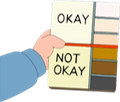40
you are viewing a single comment's thread
view the rest of the comments
view the rest of the comments
this post was submitted on 30 Aug 2023
40 points (100.0% liked)
askchapo
23225 readers
56 users here now
Ask Hexbear is the place to ask and answer ~~thought-provoking~~ questions.
Rules:
-
Posts must ask a question.
-
If the question asked is serious, answer seriously.
-
Questions where you want to learn more about socialism are allowed, but questions in bad faith are not.
-
Try !feedback@hexbear.net if you're having questions about regarding moderation, site policy, the site itself, development, volunteering or the mod team.
founded 5 years ago
MODERATORS



theyre not interchangeable, whence means "from where" not just "where"
its been many years since i opened a math textbook but maybe its common in this sort of discourse where you need to explain whence something comes
Okay, I actually dug up the book, and I think I'm starting to understand how the authors are using "whence."
When math books use "where," they use it to clarify variables of some given formula. So you have something like:
Let X = A + B and Y = A + C where A = 2k, B = 2k + 1, and C = 2k + 1The "from where" definition doesn't make much sense when you substitute one for another, but it does make sense when you reverse the order in which the formulas are introduced.
Let A = 2k, B = 2k + 1, and C = 2k + 1 whence X = A + B and Y = A + CIn other words, "where" links a main formula with smaller formulas that clarify on the main formula while "whence" links smaller formulas which are then used to build a main formula. Most math books I've seen would phrase the statement like
Let A = 2k, B = 2k + 1, C = 2k + 1, X = A + B, and Y = A + Cor
Let A = 2k, B = 2k + 1, and C = 2k + 1, and consider X and Y such that X = A + B, and Y = A + CI guess that's a mystery solved. I really wished I figured this out while I was studying for my finals instead of over a decade later lmao